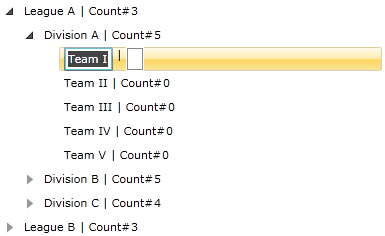ItemEditTemplateSelector
Telerik RadTreeView also supports ItemEditTemplateSelector. This tutorial will walk you through the common task of creating and applying ItemEditTemplateSelector.
If you want to read about ItemEditTemplate, see the main topic ItemEditTemplate.
ItemEditTemplateSelector
The most common use of the "selectors" is to display different kind of data (different kind of items).
For the purpose of this tutorial will be used the following treeview declaration:
<UserControl.Resources>
<sampleData:RadTreeViewSampleData x:Key="DataSource"/>
<DataTemplate x:Key="Team">
<StackPanel Orientation="Horizontal">
<TextBlock Text="{Binding TeamName}" Foreground="{Binding TeamColor}"/>
<TextBlock Text=" | Count#"/>
<TextBlock Text="{Binding Count}"/>
</StackPanel>
</DataTemplate>
<telerik:HierarchicalDataTemplate x:Key="Division" ItemTemplate="{StaticResource Team}"
ItemsSource="{Binding Teams}">
<StackPanel Orientation="Horizontal">
<TextBlock Text="{Binding DivisionName}" Foreground="{Binding DivisionColor}"/>
<TextBlock Text=" | Count#"/>
<TextBlock Text="{Binding Count}"/>
</StackPanel>
</telerik:HierarchicalDataTemplate>
<telerik:HierarchicalDataTemplate x:Key="League" ItemTemplate="{StaticResource Division}"
ItemsSource="{Binding Divisions}">
<StackPanel Orientation="Horizontal">
<TextBlock Text="{Binding LeagueName}" Foreground="{Binding LeagueColor}"/>
<TextBlock Text=" | Count#"/>
<TextBlock Text="{Binding Count}"/>
</StackPanel>
</telerik:HierarchicalDataTemplate>
</UserControl.Resources>
<Grid x:Name="LayoutRoot" Background="White">
<telerik:RadTreeView x:Name="radTreeView"
IsEditable="True" Margin="8"
ItemsSource="{Binding Source={StaticResource DataSource}, Path=LeaguesDataSource}"
ItemTemplate="{StaticResource League}"/>
</Grid>
If you want to read more about HierarchicalDataTemplate and DataBinding, see the main topics about HierarchicalDataTemplate and Binding to Object.
-
Create three DataTemplates in the resources of your application (user control). These templates will be used by the selector as edit templates.
-
LeagueItemEditTemplate
<DataTemplate x:Key="LeagueItemEditTemplate"> <Grid> <StackPanel Orientation="Horizontal"> <TextBox Text="{Binding LeagueName, Mode=TwoWay}"/> <telerik:RadMaskedNumericInput Mask="#" Value="{Binding Count, Mode=OneWay}"/> </StackPanel> </Grid> </DataTemplate> -
DivisionItemEditTemplate
<DataTemplate x:Key="DivisionItemEditTemplate"> <Grid> <StackPanel Orientation="Horizontal"> <telerik:RadMaskedNumericInput Mask="#" Value="{Binding Count, Mode=OneWay}"/> <TextBox Text="{Binding DivisionName, Mode=TwoWay}"/> </StackPanel> </Grid> </DataTemplate> -
TeamItemEditTemplate
<DataTemplate x:Key="TeamItemEditTemplate"> <Grid> <StackPanel Orientation="Horizontal"> <TextBox Text="{Binding TeamName, Mode=TwoWay}"/> <TextBlock Text=" | "/> <telerik:RadMaskedNumericInput Mask="#" Value="{Binding Count, Mode=OneWay}"/> </StackPanel> </Grid> </DataTemplate>
In order to use the Telerik RadMaskedNumericInput you need to add a reference to the Telerik.Windows.Controls.Input assembly in your user control.
These are the three DataTemplates, which will be used as edit templates. Accordingly, when the object type is League, then the LeagueItemEditTemplate will be applied; when the object type is Division, then the DivisionItemEditTemplate will be applied; when the object type is Team, then the TeamItemEditTemplate will be applied.
-
The next step is to create a selector where the logic about selecting the right template will be.
-
Create a new class, named LeagueItemEditTemplateSelector, which derives from DataTemplateSelector.
public class LeagueDataTemplateSelector : DataTemplateSelector { }Public Class LeagueDataTemplateSelector Inherits DataTemplateSelector End Class -
Override the SelectTemplate method and implement your custom logic in it. The method accepts as arguments an object and a DependencyObject. The object argument is the actual object being bound and the DependecyObject is the container for it.
Please note that in order to use the HierarchicalDataTemplate class, you need to add a using statement for the Telerik.Windows.Controls namespace
public class LeagueItemEditTemplateSelector : DataTemplateSelector { private DataTemplate leagueTemplate; private DataTemplate divisionTemplate; private DataTemplate teamTemplate; public override DataTemplate SelectTemplate( object item, DependencyObject container ) { if ( item is League ) return this.leagueTemplate; else if ( item is Division ) return this.divisionTemplate; else if ( item is Team ) return this.teamTemplate; return null; } public DataTemplate LeagueTemplate { get { return leagueTemplate; } set { leagueTemplate = value; } } public DataTemplate DivisionTemplate { get { return divisionTemplate; } set { divisionTemplate = value; } } public DataTemplate TeamTemplate { get { return teamTemplate; } set { teamTemplate = value; } } }Public Class LeagueItemEditTemplateSelector Inherits DataTemplateSelector Private m_leagueTemplate As DataTemplate Private m_divisionTemplate As DataTemplate Private m_teamTemplate As DataTemplate Public Overloads Overrides Function SelectTemplate(ByVal item As Object, ByVal container As DependencyObject) As DataTemplate If TypeOf item Is League Then Return Me.m_leagueTemplate ElseIf TypeOf item Is Division Then Return Me.m_divisionTemplate ElseIf TypeOf item Is Team Then Return Me.m_teamTemplate End If Return Nothing End Function Public Property LeagueTemplate() As DataTemplate Get Return m_leagueTemplate End Get Set(ByVal value As DataTemplate) m_leagueTemplate = value End Set End Property Public Property DivisionTemplate() As DataTemplate Get Return m_divisionTemplate End Get Set(ByVal value As DataTemplate) m_divisionTemplate = value End Set End Property Public Property TeamTemplate() As DataTemplate Get Return m_teamTemplate End Get Set(ByVal value As DataTemplate) m_teamTemplate = value End Set End Property End Class -
Define the created selector as a resource in your XAML and set it to the ItemEditTemplateSelector property.
<UserControl.Resources> <sampleData:LeagueItemEditTemplateSelector x:Key="myEditDataTemplateSelector" LeagueTemplate="{StaticResource LeagueItemEditTemplate}" DivisionTemplate="{StaticResource DivisionItemEditTemplate}" TeamTemplate="{StaticResource TeamItemEditTemplate}"/> </UserControl.Resources><telerik:RadTreeView x:Name="radTreeView" IsEditable="True" Margin="8" ItemsSource="{Binding Source={StaticResource DataSource}, Path=LeaguesDataSource}" ItemTemplate="{StaticResource League}" ItemEditTemplate="{x:Null}" ItemEditTemplateSelector="{StaticResource myEditDataTemplateSelector}"/>
The Telerik RadTreeView provides a default ItemEditTemplate which takes precedence. That's why in order to use ItemEditTemplateSelector, you need to null the ItemEditTemplate. In code this is trivial, in XAML can be done with the following:
ItemEditTemplate="{x:Null}"
Don't forget to null the ItemEditTemplate, because otherwise your template selector won't be applied.
Here are some snapshots when you edit an object of type League and when you edit an object of type Team:

